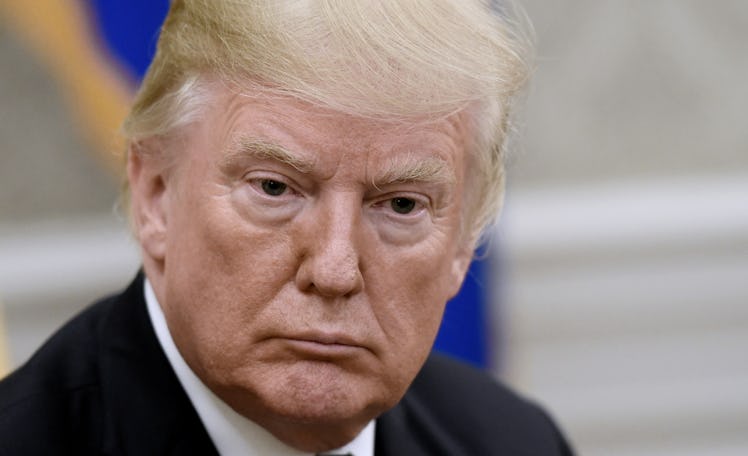
Trump’s Leaked Birth Control Rule Could Disrupt Coverage for 62 Million Women
For months, the Trump administration has reportedly been working on a directive that would affect birth control access for millions of women. On Thursday, Oct. 5, word spread from reporters and Planned Parenthood that a leaked directive could be announced as early as Friday, Oct. 6. The Trump birth control directive, which was originally leaked in May, would put birth control coverage for 62 million women at risk.
UPDATE: The rollback of the Obama-era birth control coverage protection was announced on Friday, Oct. 6.
EARLIER: Currently, the Affordable Care Act (ACA, aka Obamacare) requires insurance companies to cover all FDA-approved birth control. Employers must provide coverage as well, although the ACA allowed exemptions for religiously-affiliated employers who object to birth control.
Additionally, a 2014 Supreme Court case, Hobby Lobby v. Burwell, determined that private, non-religiously-affiliated companies may also be exempt from providing birth control on religious grounds — a disheartening decision to reproductive rights advocates. Currently, the ACA ensures that some individuals whose employers object to contraception can get coverage through other means.
Now, according to Planned Parenthood, the leaked rule would do two things: eliminate that coverage protection for employees of religiously affiliated businesses, and allow any employers and insurers, regardless of religious affiliation, to deny birth control coverage on the basis of moral objection.
This would put approximately 62 million women's birth control coverage at risk.
Dana Singiser, vice president of Public Policy and Government Affairs for Planned Parenthood, says of the coming rule,
Let’s be clear: this rule has nothing to do with religion. Under the Affordable Care Act religious organizations already have an accommodation that still ensures their employees get coverage through other means.
Elite Daily previously reported on the Trump administration's plan to revoke protections for birth control coverage. If and when the rule goes into effect, employers will be able to opt out of coverage immediately.
The Obama-era mandate saved women $1.4 billion on birth control in its first year. It has also contributed to the lowest abortion rate since Roe v. Wade in 1973, according to The Guardian.
Consulting Medical Director for Physicians for Reproductive Health Dr. Anne Davis released a statement regarding the impending directive. She is, she says, concerned about the serious consequences of limiting access to birth control.
"Every day, I see the impact that birth control access has had on my patients' health and well-being," she says. "The contraceptive coverage benefit under the [ACA] has done so much to reduce the barriers to birth control that my patients frequently faced.
According to the Guttmacher Institute, contraceptive use is ubiquitous and uncontroversial. More than 99 percent of women who have had intercourse have used at least one contraceptive method, and approximately 62 percent of women of childbearing age are currently using at least one contraceptive method.
A 2012 Gallup poll shows that Americans overwhelmingly support birth control: 89 percent of all Americans say birth control is "morally acceptable." There's hardly a loud cry for limiting accessibility — which is what Trump's directive will do.
Additionally, birth control isn't just used to prevent pregnancy. It's often used for medical purposes, such as managing endometriosis and Polycystic Ovarian Syndrome (PCOS), so this directive could have dire medical consequences for many women.
In fact, the Executive Vice President and CEO of the American College of Obstetricians, Dr. Hal Lawrence, agrees with that assessment. He said,
Contraception is an integral part of preventive care and a medical necessity for women during approximately 30 years of their lives. Since the Affordable Care Act increased access to contraceptives, our nation has achieved a 30 year low in its unintended pregnancy rate, including among teens. Any move to decrease access to these vital services would have damaging effects on public health and would essentially, turn back the clock on women’s health.
But this is what happens when the most male-dominated administration in decades is in charge: vital programs are ended by people who don't personally benefit from them.
Trump's administration is also populated by virulently anti-abortion, anti-birth control individuals, such as Teresa Manning, an anti-abortion advocate who Trump tapped as deputy assistant secretary for population affairs at the Department of Health and Human Services, according to The Hill. Former Secretary of HHS Tom Price — who was ousted after Politico discovered he had spent over $1 million of taxpayer money on private and military jets — also quietly ended a teen pregnancy prevention program that, in part, gave teens access to birth control. There are also Katy Talento and Matthew Bowman — the latter of whom fought the very birth control mandate Trump is planning to end when he was a lawyer with the Alliance Defending Freedom, a conservative nonprofit that advocates for "religious freedom," according to The New York Times.
Additionally — and perhaps most concerning — Current Supreme Court Justice Neil Gorsuch ruled in favor of Hobby Lobby in a Court of Appeals in 2013. He has been an outspoken supporter of religious freedom, which he has defined broadly throughout his career, which means that if Trump's birth control rule is challenged in court, the Supreme Court could very well rule in favor of Trump.
And despite the horrible timing — with at least 59 dead after a shooting in Las Vegas and millions in Puerto Rico still without clean drinking water or electricity — it's absolutely unsurprising to hear that the Trump administration is, yet again, attacking women's health initiatives.
"This rule is about taking away women's fundamental health care," Singiser says. "If you truly want to reduce the need for abortion, invest in women's health and preventive care."